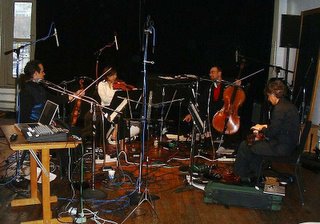 Dispersion Of Seeds for String Quartet & Computer is a work by Elliott Sharp that I've been spending some time with recently. It's part of his "Zoar Portal Series" limited releases (I have #15 of 200 copies). The linear notes in their entirety read:
Dispersion Of Seeds for String Quartet & Computer is a work by Elliott Sharp that I've been spending some time with recently. It's part of his "Zoar Portal Series" limited releases (I have #15 of 200 copies). The linear notes in their entirety read:Composed in March 2003, The Dispersion of Seeds takes its title from the recently-discovered natural history work from 1862 by Henry David Thoreau dealing with the mechanism of reforestation and the propagation of plant tree species, a ripe metaphor for the possibility of positive memes thriving and spreading in a time of crass stupidity, fear, and militarism. In this recording, the 16-minute score is first presented in its original acoustic manifestation and then in two versions each representing different software processing strategies. The three may be listened to separately or serially as one longer composition.So far I've always chosen to take in all three "movements" as a longer experience. And as an aural manifestation of sounds and ideas propagating outward from seeds that yield recognizable variations over a consistent sonic fabric this is an enormously successful work. Though there is something unsettling about the unnatural symmetry of three movements that are exactly 16 minutes in duration (and it's deeply odd that I perceive this precise squaring off of time with each listening. Perhaps this is reinforced by the consistency of each idea returning at such regular temporal intervals). The overall attractiveness of the sonic texture holds my attention throughout.
 Sonically, there is quiet yet forceful dissonance to this composition. The Sirius String Quartet does an excellent job of building up some brittle tones that thrive within a healthy dynamic range. The digital processing of this material preserves much of this quality as the sound of the source material is rarely obscured. Instead, much of the processing seems to focus on molding the reverberant qualities of the sound with an emphasis on extending tones in a manner that reinforces the sense of "growth" of these seeds. It is really only late in the third "movement" that the digital processing occasionally steps into the foreground for brief intervals. The transition from acoustic to digital (via "growth") is fairly subtle.
Sonically, there is quiet yet forceful dissonance to this composition. The Sirius String Quartet does an excellent job of building up some brittle tones that thrive within a healthy dynamic range. The digital processing of this material preserves much of this quality as the sound of the source material is rarely obscured. Instead, much of the processing seems to focus on molding the reverberant qualities of the sound with an emphasis on extending tones in a manner that reinforces the sense of "growth" of these seeds. It is really only late in the third "movement" that the digital processing occasionally steps into the foreground for brief intervals. The transition from acoustic to digital (via "growth") is fairly subtle.The ideas, or "positive memes," that make up this composition fill out a rich forrest of sound. Hearing these germs return as temporally altered growths is an enormously satisfying experience. Chamber music proves to be Elliott Sharp's best medium as his ideas seem to find deep roots that reveal more detail with each listening.


No comments:
Post a Comment